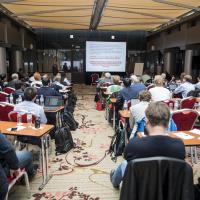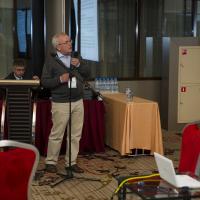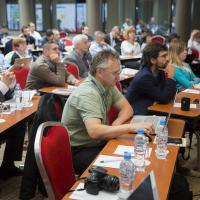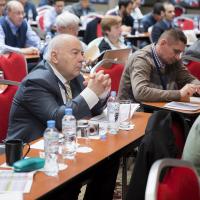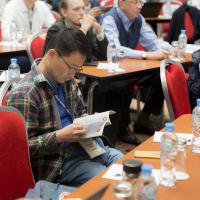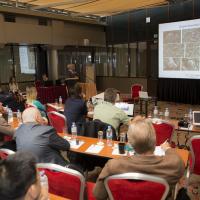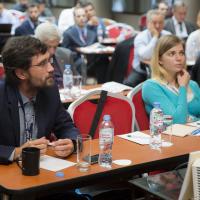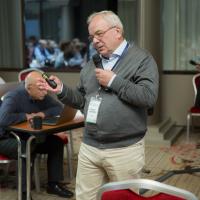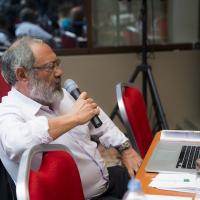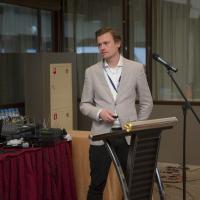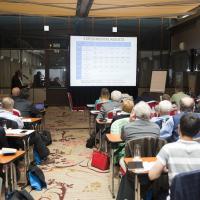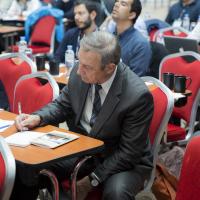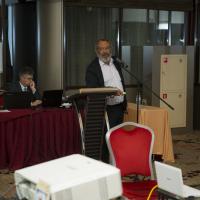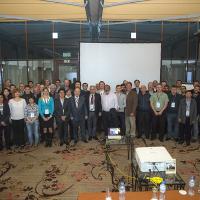On September, 25-27 Moscow has hosted the 5th International Symposium on Liquid metals Applications for Fusion (ISLA-2017), organized by MEPhI and supported by the Russian Scientific Foundation. The conference was held in Russia for the first time and brought together leading scientists from 14 countries.
The focus of the conference was given to the development of technology of using liquid metals (primarily lithium) to protect the walls of thermonuclear facilities, which has great potential due to the possibility of its surface resumption after plasma impact. Recent results on large-scale facilities like T-10, T-11M (Russia), TJ-II (Spain), FTU (Italy), EAST (China) have shown convincing progress in this direction. Suffice it to say that for the first time retention of hot plasma for 100 seconds at a current of 400 kA was achieved at the Chinese EAST tokamak just with the use of lithium. Great progress is also demonstrated in the computer modeling of the interaction of plasma with liquid-metal wall.
There is an increasing research in this area. Followed by Russia, USA and China, Europe has launched a program to develop a project of fusion reactor DEMO with liquid-metal wall.
The conference in Moscow allowed a large number of young participants from Russia, many of them are graduates and postgraduates of MEPhI, to speak at the scientific forum of such a high level.
Participants were satisfied and spoke with warmth about Moscow and the organization level of the conference.
Francisco Tabares, Spain: “I work at the stellarator TJ-II and is responsible for lithiation of walls and conducting laboratory experiments with lithium. We have started research on application of liquid metals in 2007. I was the organizer of the previous ISLA conference in Granada (Spain) two years ago and I believe that only the use of liquid metals allows you to withstand the huge loads equivalent to the loads on the surface of the sun. This year the conference was organized very well.
Moscow is very beautiful city! Most people came to Moscow for the first time and got acquainted with the culture and sights of the city. Many don't know yet how the city actually lives after the collapse of the Soviet Union.
There are new participants, primarily due to the opening of a new European programme of experiments on the COMPASS tokamak in the Czech Republic for the test of elements based on liquid lithium.
I believe that the ISLA symposium has very good future. Today's conference closed the first cycle of conferences held in different countries of the world, launched in 2010 in Japan, then in Princeton (USA), Frascati (Italy), Granada (Spain). Starting with the next conference in the United States a new round begins, which should be not less successful.”
Alexander Prishvitsyn, student of MEPhI: "Among the participants were world-known scientists in plasma physics and the plasma interaction with the surface. The conference presented reports on the application of liquid metals (mainly lithium) in plasma installations, I'm doing this theme in the course of my research practice. I was surprised by the large number of works devoted to the use of liquid stannum in facilities, it is the theme which caused the most active discussion of the leading scientists of the world.
In general, all three days of the conference were best remembered for the working atmosphere, interesting discussions and presentations of young scientists from Russia, Holland and China.”
Michal Poradzinski, Poland: "I participate in the ISLA conference for the first time. I have been doing research in this area only two years, and I think that this direction is a very promising alternative to the use of tungsten in thermonuclear installations. Participation in the conference was an opportunity to meet new people. The conference was not very big, which gave a chance to communicate with all participants. It’s my first time in Moscow, and I can say that the capital of Russia looks better than the pictures I've seen before. I really liked the city and I would like to visit it again.”
Irina Tazhibayeva, Kazakhstan: "I liked the hotel and the conference venue. There was a very interesting reports program. They provided an opportunity for some participants to make a speech remotely via the Internet. In the future, video conferencing can be used more widely, as it would allow a greater number of people to take part in the discussion."





